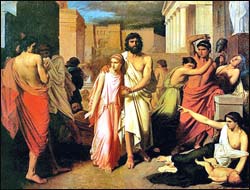Reigning with a wounded heart
 He
whom I killed He
whom I killed
Had sought to kill
me first
Acquits me innocent,
as ignorant
Of what I did
Oedipus by Sophocles
Throughout time there has existed a constant struggle between fathers
and sons, almost as a rite of passage into manhood. In literature it is
usual to find the father presented in a negative light focusing on his
authoritarian aspect or on him as an abuser.
Many literary works have addressed this very issue either directly or
as a methodology to assist in the development of a story or to establish
literary techniques such as theme and plot setting. The problematic
relationship between father and son is therefore timeless and although
there are differences between the various struggles, similarities also
exist.
|

Mr. Micawber and David in David Copperfield |
|

A scene from Oedipus |
The Mahavansa chronicle of Sinhabahu tells about an early account of
father-son rivalry. Its stage adaptation, Ediriweera Sarachchandra’s
Sinhabahu has been considered as an excellent piece of work which
reflects parental affection towards their children as well as concept of
freedom.
Again Mahawansa presents the ‘cold war’ between King Kavantissa and
his rebellious son Gamini. Kasyapa murdered his father king Dhatusena by
walling him alive and then usurping the throne which rightfully belonged
to his brother Mogallana, Dhatusena’s son by the true queen.
There is Oedipus, of course, who unknowingly kills his father,
thereby bringing a curse upon Thebes. There is The Odyssey, where the
son is just beginning to find his own way when his famous father
returns, starts running the show again, and saves the day.
In a contrasting story in Henry IV, there is Prince Hal, a source of
grief to his father who removes the crown before his father is even dead
(although, in his defense, Hal thinks Henry is dead) and then goes on to
become a greater man than his father. And there is Hamlet, taking grim
marching orders from a father who returns from the grave.
In Freudian criticism/psychoanalytic criticism, this concept of
father-son rivalry is broadly discussed. Applying his own principles of
psychoanalysis, Sigmund Freud contributed some fascinating
interpretative essays.
In them he discussed the characters of Oedipus and Hamlet and
presented the concept of the Oedipus complex. The Oedipus complex is a
group of largely unconscious ideas and feelings which concentrate on the
desire to possess the parent of the opposite sex and eliminate the
parent of the same sex.
Psychoanalysis and Oedipus complex are often taken into account when
discussing D.H. Lawrence novel, Sons and Lovers. The incomplete and
imperfect relationships of Sons and Lovers are among the most analysed
in English Literature.
Paul Morel’s imprisoning relationship with his mother cripples all
his other relationships. Early on it is evident that Mrs. Morel
substitutes attachment for her sons for the broken connection with her
husband, and what results is her certain domination over Paul in
particular.
What begins as a warm, wholesome attachment between mother and child
later becomes shaded with incestuous overtones and ends as the
controlling force in Paul’s life.
I was particularly struck, as I surveyed the literature, how often
fathers are absent in literature. Dickens’ novels especially are marked
by the absence of fathers, and many of his characters are orphans who
must make their own way in the world (Oliver Twist, Nicholas Nickleby,
David Copperfield, Pip in Great Expectations).
When Dickens does create a father, as he does most notably with Mr.
Micawber in David Copperfield, the figure is irresponsible and
ineffective, much like Dickens’ own father, who spent time in debtor’s
prison and could not protect his son from child labor. Nick Cratchit in
A Christmas Carol may be an idealised father, but Tiny Tim is not yet at
an age where he must establish his own separate identity.
Father has a culturally determined role in each society. Literature
is something that always tends to surpass or exaggerate the existing
socio-cultural norms. Oedipus, Kasyapa or Sinhabahu are very rebellious
yet successful characters which were penned by writers belong to the
history. |



